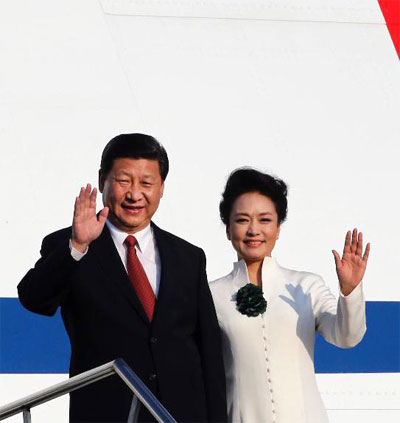 |
|
Chinese President Xi Jinping and his wife Peng Liyuan wave as they arrive at Bali, Indonesia on October 5, 2013. [Photo/Xinhua] |
|
President Xi Jinping is expected to sign several cooperative agreements in manufacturing, finance, energy and cultural exchanges in an upcoming tour of Europe that experts said will set a tone for future ties. Xi will kick off his trip on Saturday and participate in the Nuclear Security Summit scheduled for March 24 and 25 at The Hague in the Netherlands, Vice-Foreign Minister Wang Chao said at a news conference on Monday. He is also expected to hold a meeting with US President Barack Obama on the sidelines of the summit. Xi will be the first Chinese president to visit the Netherlands since the two countries established diplomatic ties in 1972. From the Netherlands, Xi will travel to France and visit the UNESCO headquarters. He will then make a stop in Germany before ending his tour in Belgium to visit the headquarters of the European Union in Brussels. "China-Europe ties are developing smoothly in general ... This visit will inject new energy into the long-term stable development of China-Europe ties and will be a milestone for relations," Wang said. Trade between China and the European Union reached $559 billion in 2013, according to Chinese statistics. The EU has been China's largest trade partner for 10 years, and China has been the second-largest trade partner of the 28-member bloc for 11 years. In the Netherlands, Xi is expected to sign cooperative agreements in agriculture, energy, finance and culture and is slated to meet with King Willem-Alexander and Prime Minister Mark Rutte, Wang said. In France, Xi will meet President Francois Hollande and Prime Minister Jean-Marc Ayrault and sign agreements to boost China-France cooperation in energy, aerospace, urbanization, agriculture and finance. This year marks the 50th anniversary of the establishment of China-France diplomatic relations. "Compared with other Western countries, Paris has always played a leading role in cooperating with Beijing in different phases of China's development," said Ding Chun, a professor of European studies at Fudan University in Shanghai. "Paris' recognition of Beijing in 1964 not only shook up the order imposed by the US and the Soviet Union during the Cold War but was also a breakthrough in building a multipolar world," Ding said. In Germany, Xi will meet German President Joachim Gauck and Chancellor Angela Merkel in Berlin, the first visit to Germany by a Chinese president in eight years. Xi is slated to sign a number of economic deals. China and Germany "have kicked ties into high gear over the past decade", said Yang Xiepu, a researcher on German studies with the Chinese Academy of Social Sciences. "In the framework of the China-Germany strategic partnership, economic cooperation will continue to be the cornerstone of Beijing-Berlin ties," Yang said in a report on China-EU relations recently released by the academy. In Belgium, Xi will meet with King Philippe and Prime Minister Elio Di Rupo and sign agreements in trade, science and technology and education, Wang said. Xi will also visit the EU's headquarters in Brussels to discuss the future of China-EU relations with President of the European Council Herman Van Rompuy, European Parliament President Martin Schulz and European Commission President Jose Manuel Barroso. Japan's nuke stockpile China urged Japan to respond to concerns from the international community over its "excessive" nuclear stockpiles, said Vice-Foreign Minister Li Baodong at the Monday news conference. According to a January report from Japan's Kyodo News Agency, the United States gave 331 kg of weapons-grade plutonium to Japan during the Cold War. That amount, according to the report, could be used to produce 40 to 50 nuclear weapons. At a Nuclear Security Summit in 2010, held in the US, Washington asked Tokyo to return the material. The issue is slated for discussion at The Hague. By Zhou Wa (China Daily)
|
习近平主席即将访问欧洲,此行会与欧洲在制造业、金融、能源和文化交流方面签署多个合作协议,专家表示这会为中欧未来关系定下基调。 3月17日,外交部副部长王超在一次新闻发布会上说:本周六(3月22日)习主席将访欧,参加3月24-25日在荷兰海牙举行的核安全峰会。他说习主席与美国总统奥巴马还会在峰会之外举行一次会晤。 这是自1972年中荷两国建交以来中国国家元首首次访问荷兰。 荷兰之行结束后,习近平将前往法国,参观联合国教科文组织(UNESCO)总部。之后会在德国短暂停留,再前往比利时参观布鲁塞尔的欧盟总部,欧洲之行就此结束。 王超说:“大体上讲,中欧关系发展良好……习主席此行会为中欧关系长期稳定的发展注入新的能量,将会是双方关系发展中的里程碑。” 据中国官方统计,2013年中国与欧盟之间的贸易额达到5590亿美元。十年来欧盟一直是中国最大的贸易伙伴。而十一年来中国一直是欧盟(现有28个成员国)的第二大贸易伙伴。 王超说,在荷兰,习主席将会签署农业、能源、金融和文化方面的合作协议。他也将会见荷兰国王威廉·亚历山大及荷兰首相马克·吕特。 在法国,习主席将会见总统弗朗索瓦·奥朗德及总理让·马克·埃罗,并签署相关协议,推动中法在能源、航天、城市化、农业和金融方面的合作。 今年是中法建交50周年。 上海复旦大学欧洲问题研究教授丁纯说:“和其他西方国家相比,在中国发展的不同时期,法国在与中国合作中一直起着领导作用。” “1964年中法建交,不仅动摇了冷战期间美苏推行的国际秩序,也是在建立多元世界格局中的一大突破。”丁纯说。 在德国,习主席将会见德国总统约阿希姆·高克及总理安吉拉·默克尔。这是8年来中国主席首次访德。届时习主席将签署一系列经济协议。 中国社会科学院德国研究专家杨解朴说,中德关系“过去10年进展得十分良好。”在其发表的一份中欧关系研究报告中,杨认为“在中德战略伙伴关系的框架下,经济合作仍将在两国关系中起关键作用。” 王超表示,在比利时,习主席将会见国王菲利普和首相埃利奥·迪吕波,并签署有关贸易、科技和教育的协定。 习主席还将访问坐落在布鲁塞尔的欧盟总部,同欧洲理事会主席范佩龙、欧洲议会主席舒尔茨及欧盟委员会主席巴罗佐商讨中欧关系的发展前景。 日本的核原料储备 3月17日的新闻发布会上,外交部副部长李保东说,中国敦促日本就国际社会对其“过量的”核原料储备的关切作出答复。根据日本共同社一月份报道,冷战期间,美国给日本331公斤的武器级钚。报道说,这一数量可以生产40到50件核武器。 2010年在美国举行的核安全峰会上,美国要求日本归还这些原料。海牙核安全峰会上将讨论这一议题。 相关阅读 (中国日报周娃报道 译者 刘艳君 编辑 Julie) |
|
|
